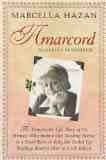Food
Amarcord: Marcella Remembers by Marcella Hazan

- Amarcord: Marcella Remembers
- Gotham, 320 pp.
And then I met …
If we are what we eat, then Marcella Hazan, the author of what are often recognized as the best six Italian cookbooks ever published in English, has been writing her autobiography since 1973. That is the year when The Classic Italian Cookbook, her first effort, saw the light of day.
Thirty-five years later, with increasingly sophisticated recipe books, restaurants and food industries in the United States, it is hard to remember how groundbreaking Hazan’s work has been. When The Classic Italian Cookbook came out, basic ingredients such as high-quality olive oil, Parmesan cheese or proscuitto (let alone porcini mushrooms or truffle oil) were the provenance of only a few big-city specialty stores. Most Italian restaurants tended to serve soggy pasta drowned in insipid tomato sauce, rather than the complicated preparations that are so widely available today. The labor of Hazan, which still offers readers the most comprehensive guide to the specialties of nearly all regions of Italy, was truly pathfinding.
Even for today’s more sophisticated home cooks, who may be well-versed in myriad other Italian recipe books, Hazan’s are still also of great importance for many reasons. A principal one is the language in which they are written. Her step-by-step instructions are easy to follow even for those of us whose cooking talents are hardly innate, with none of the frustrating ambiguity that mark the directions of carelessly written recipes.
Most of her instructions are preceded by explanations of the importance of the dish, or what sort of a meal it would form a part of, in the particular region of Italy from which it came.
Additionally, Hazan sometimes seasons her recipes with a few enchanting lines of anecdotal material. For example, in Marcella’s Italian Kitchen, before two recipes for hearty soups that both contain chick peas and porcini mushrooms, she asks, “What is it about legumes that comforts men?”
She goes on to explain that “when work or other afflictions bring down my husband, Victor, chick-peas will lift him from his depths,” and that while she sometimes makes these soups for friends, she associates them “with private celebrations, with winter evenings when Victor and I dine alone.” It is only a paragraph, but an evocative one indeed, that makes readers feel as if we have been invited into Hazan’s private world, if not precisely her family.
It is these paragraphs that made at least some of us eager when it was announced that she was set to publish her autobiography. If much of the material in the resultant effort, Amarcord: Marcella Remembers, unfortunately falls flat, there are still some anecdotal gems. However, this is a book that will be appreciated only by her most die-hard fans.
As in many biographies and autobiographies, the first chapters are the most vivid. Like quite a few of the aged — Hazan is now well into her eighties — she views her early years with a rosy burnish of nostalgia. The first pages, incredibly evocative, describe her childhood in the Emiglia-Romagna region of Italy. (Amarcord means “I remember” in the local dialect. Federico Fellini, also from Emilia-Romagna, gave one of his films — a similarly rosy although much edgier recollection — the same title.) Her descriptions of her family (including a marriage proposal her mother received at age 90) are enchanting, as are those of local fishermen grilling a type of sardine in the open air and eating them by bringing them with their hands to their lips — col bacio, with a kiss.
The chapters I found most absorbing took place during World War II, which Hazan survived as an adolescent. Her wartime tales have been buffed to a shine with humor. For instance, she recalls bombardments during mealtimes, in which each family member ran to shelter carrying his corresponding plate of food. It is only at the end of these passages, when she experiences a near-encounter with vengeful partisan soldiers, that the reader feels the full gravity of what she endured.
Unfortunately, the rest of the book does not live up to the vibrancy of the early chapters. Once she has become well-known as a cookbook writer and teacher, with students coming from all over the world to learn from her in Italy and New York, Hazan’s book suffers from a condition of many celebrity autobiographies — the “and then I met” syndrome. This disorder is typified by Charlie Chaplin’s My Autobiography, so moving in its early chapters about his impoverished childhood, his mentally ill mother, and his early years in vaudeville. However, much of the rest of the book reads like catalogues of the famous people he met, typified by a caption that says, “Here I am telling Lord Mountbatten that he is no actor.”
Hazan also lards her book with her meetings with celebrities of the cooking and the entertainment worlds, many of whom studied with her. The majority of these anecdotes are not terribly absorbing, although there is a funny one in which the comic actor Danny Kaye answered her phone, during class, in a fractured Italian dialect. (Another, about the actress Coral Browne’s attempted seduction of a seemingly asexual colleague, is brilliant, but has absolutely nothing to do with Hazan.)
Indeed, there is something a little rough around the edges of Amarcord. It reads more like sketches of Hazan’s life than a considered, digested recounting of how it was lived. The lack of specificity is frustrating. Her memories tend to be vague rather than detailed. I found myself wondering whether this was due to discretion, age or the fact that these particulars simply weren’t important to her.
This is most disappointing in terms of food, which is mentioned quite often, sometimes around a charming story. For example, Hazan basically says she fell in love with Victor, the man who would become her husband, after he convinced a waiter to bring him some seafood in the hours between lunch and dinner, when there was traditionally no service. She also mentions her indignation, upon arrival in the United States, at finding out that a coffee cake contains no coffee. “A chocolate cake has chocolate,” she writes. “An almond tart has almonds, an apple pie has apples; why doesn’t a coffee cake have coffee?”
Yet considering the book has been written by someone who has devoted her life to cooking, it is striking how little account or specificity Hazan devotes to food in the book – and how little she remembers of what she has eaten. Sadly, she writes that, “The larger part of the thousands of meals that Victor and I have had in our travels have faded to a blur in my memory, and many are altogether beyond recall.” In the same passage, she says that she did not have “a single dull or indifferent dish” while in Kyoto, but all she can remember eating is tempura.
Some memoirs of people involved with food are interspersed with recipes. There is not a single one in Amarcord. Hazan writes that she is retired from both writing and teaching cookery; which is fair enough for someone her age. She may well have published every recipe she feels worth printing, or simply be too tired to go on. Still, when she mentions dishes that she prepared in her classes or included in cookbooks — even if they have been previously published — some readers will pine for even a simple explanation of how they are made. The result, without them, is bloodless.
When Hazan tells a funny story, it is often in a sentence or two. For example, she describes an anorexic student who divided a single piece of penne pasta into four before eating it. (She was there to learn recipes for guests when she entertained.) Yet after these stories some readers will feel, so to speak, still hungry, and wonder whether they are simply the ingredients for a book that was planned but never really cooked.
Perhaps Amarcord is the raw material for a biography of Hazan that someone else may one day write. But probably the most important stories of Marcella Hazan’s life are told in her cookbooks. Happily, most of them are still in print.
David Lida is a writer living in Mexico City. Pagina de Inicio








You must be logged in to post a comment Login